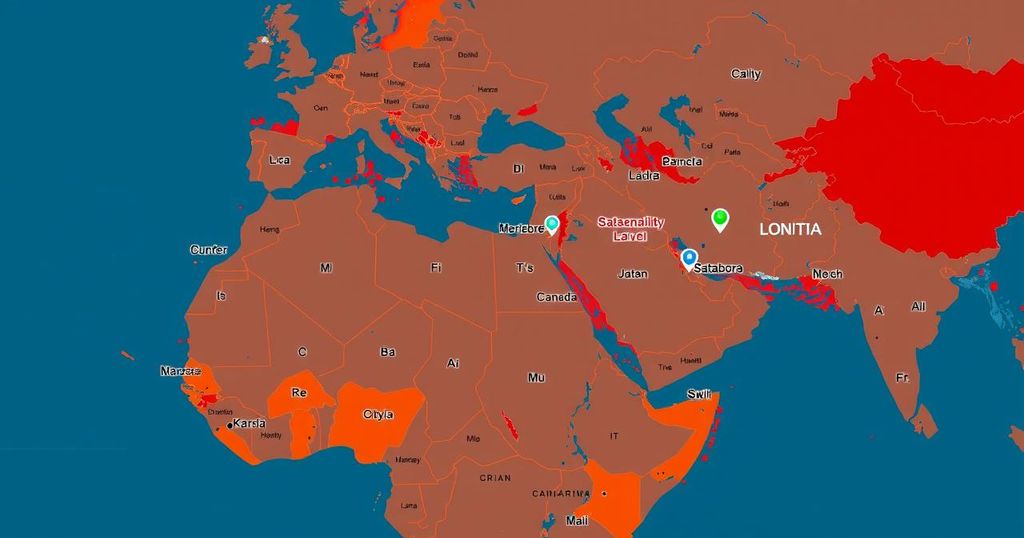Zimbabwe Accused of Interfering in Neighboring Elections: A Regional Controversy Unfolds

Zimbabwe is facing allegations of electoral interference in neighboring countries—Botswana, Namibia, and Mozambique—stemming from its ruling party Zanu-PF’s active campaigns alongside regional allies. Accusations include unauthorized voting in Mozambique and campaigning for local parties. While government spokespeople deny these claims, opposition leaders highlight concerns over sovereignty and the integrity of elections in the region amidst rising tensions.
Zimbabwe’s involvement in the electoral processes of neighboring countries has drawn significant criticism, particularly from opposition groups in Botswana, Namibia, and Mozambique. The Zimbabwe African National Union-Patriotic Front (Zanu-PF), as the ruling party, has been accused of meddling in the electoral affairs of these nations, leveraging its historical ties with regional ruling parties. The controversy intensified when Zanu-PF dispatched campaign teams to assist Mozambique’s Front for the Liberation of Mozambique (Frelimo) in the lead-up to the contentious elections held on October 9. Reportedly, Frelimo was granted permission to conduct campaign rallies across Zimbabwe, aiming to garner support from the Mozambican diaspora living in the country. Furthermore, some Zanu-PF members reportedly participated in the voting process in Mozambique, taking advantage of the diaspora voting opportunities. In Botswana, Zanu-PF officials have been seen actively campaigning alongside the ruling Botswana Democratic Party (BDP) ahead of the upcoming elections scheduled for October 30. Namibia’s opposition has expressed alarm over a South African company’s involvement in printing ballots for the November 27 elections, asserting that this company has ties to associates of Zimbabwean President Emmerson Mnangagwa. Earlier this year, Zanu-PF convened a conference for liberation parties within the Southern African Development Community (SADC), asserting its role in fostering regional solidarity against perceived neo-colonial influences. Notable attendees included the African National Congress (ANC) from South Africa and other liberation movements across the region, although their participation has not shielded Zimbabwe from allegations of interference in local elections. Former Botswana President Ian Khama has publicly denounced Zimbabwe’s alleged electoral manipulations, stating, “We just learnt that members of Zanu-PF voted in the just ended Mozambique general elections.” He further warned that there were concerns about possible electoral rigging linked to foreign interference. In response to these accusations, Zimbabwean government spokesperson Nick Mangwana refuted claims of interference, emphasizing that Zimbabwe engages diplomatically with democratically elected governments, and illustrating that its involvement in regional elections is primarily observational rather than interventionist. The allegations of electoral meddling extend beyond current affairs, with historical tensions resurfacing. Zimbabwe previously accused Zambian President Hakainde Hichilema of attempting to influence Zimbabwe’s recent elections, leading to diplomatic friction following Zimbabwe’s criticism of Zambia’s electoral process. This culmination of tensions reflects a complex interplay of regional politics where past grievances intersect with current events. The ongoing scrutiny of Zimbabwe’s regional activities raises significant questions about ethics in governance and the integrity of electoral processes within Southern Africa. As the current chair of SADC, Zimbabwe may find itself in a position where it must mediate rising disputes regarding election legitimacy while managing its own political controversies. Zimbabwe’s interventions have sparked protests among opposition parties in Mozambique, who cite electoral irregularities that favor Frelimo. This raises concerns about the soundness and fairness of electoral practices amidst accusations of indiscretions seven months later. Such developments illustrate a precarious moment for regional stability as Zimbabwe grapples with its political legacy and attempts to assert influence within the broader SADC framework, setting the stage for potential conflicts and collaborative political engagements in the future.
The political landscape in Southern Africa is complex, historically marked by liberation movements which have shaped governance and political affiliations among neighboring countries. Zimbabwe’s Zanu-PF party remains among the few liberation movements in power, actively participating in regional politics along ideological lines. Its interventions in the elections of Botswana, Namibia, and Mozambique are seen as efforts to maintain alliances with sympathetic governments, a strategy that has stirred accusations of electoral interference from opposition parties in those nations, reflecting broader concerns about sovereignty and democratic integrity within the region.
In summary, Zimbabwe’s involvement in regional electoral processes has ignited fierce criticisms from neighboring countries, with accusations of interference by its ruling party Zanu-PF. While Zimbabwean officials deny these allegations, asserting that their actions are legitimate and within the framework of regional solidarity, opposition leaders in various countries are increasingly vigilant and vocal about perceived threats to the integrity of their political systems. The potential consequences of such actions could influence not only bilateral relations but may also affect Zimbabwe’s leadership role within the SADC.
Original Source: www.theeastafrican.co.ke







